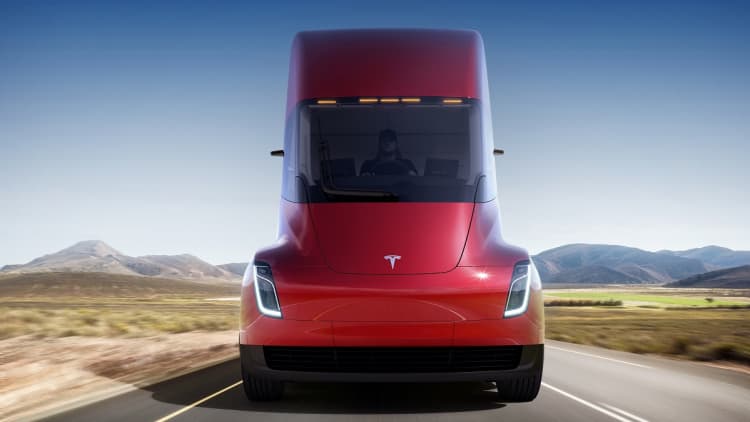Tesla is delaying production and deliveries of its all-electric Semi trucks until 2021, the company said in its Q1 2020 earnings report on Wednesday. The Tesla Semi program, led by President of Automotive Jerrome Guillen, is now two years behind schedule.
When Tesla unveiled the Semi to great fanfare in Nov. 2017, CEO Elon Musk said the battery-electric class 8 trucks would be delivered to customers in 2019. In months that followed, Tesla took pre-orders for the Semi, which initially required a $5,000 deposit. Later, Tesla upped the reservation fee to $20,000 per Semi.
Companies including Anheuser-Busch, PepsiCo, Walmart, and others with the goal of electrifying their fleets and avoiding diesel emissions all reportedly ordered the Tesla Semi.
The vehicle was seen as a potential competitor to traditional class 8 trucks and forthcoming electric offerings from other carmakers, like Daimler's Freightliner eCascadia and Volvo's VRN Electric.
Last April, Tesla even used Semi prototype trucks to deliver cars to customers as a marketing stunt.
But by its 2019 third-quarter earnings report, Tesla was tempering expectations, saying: "We are planning to produce limited volumes of Tesla Semi in 2020." And in the company's Q4 2019 earnings call in Jan. 2020, Elon Musk groused about the company's need to improve and lower the cost of making batteries for its vehicles.
He said, "If you don't improve that, you end up shifting unit volume from one part to another and you haven't actually produced more electric vehicles. That's one reason we have not accelerated production of the Tesla Semi. Because it does use a lot of cells. Unless we have got those cells available, then accelerating production of the Semi would mean making fewer Model 3 or other cars."
Besides the Semi, Tesla has also promised to build and start vehicle production at a factory near Berlin by the end of 2021, and told customers and investors to expecct "feature-complete" self-driving technology and a new Plaid powertrain this year, with a next-generation Roadster and Cybertruck also on the horizon.



